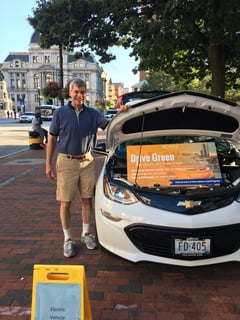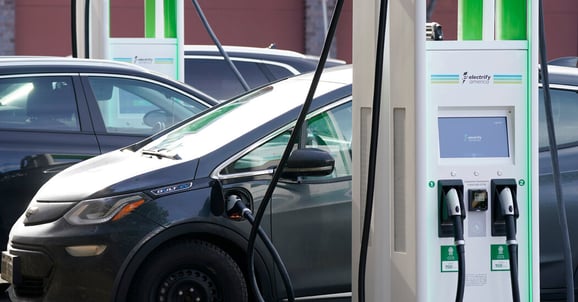Public Listening Session #2 & 3:
We think the EV charging plan is an excellent opportunity to accelerate Rhode Island’s transition to a low-carbon future. As of June 2020, Rhode Island had roughly 3,000 EVs on the road, which means we’re not on track to meet the state EV adoption goal set in 2013 to get 43,000 EVs by 2025. Roughly 50,000 new cars are sold annually in RI, and in 2019, just 1.3% of those cars were electric.

Looking at these numbers, we at Green Energy Consumers Alliance think it’s unlikely that Rhode Island reaches the 2025 goal. However, a robust EV charging plan can prove us wrong and make up for lost time. After all, there are more affordable, long-range EVs available for sale now than ever before. Combined with a better charging network, Rhode Island can at least catch up to our neighbors in Massachusetts and Connecticut, where EVs make up about 3% of sales.
What's the role of the utility company?
Many public EV charging stations in Rhode Island have been installed thanks to “Make Ready” investments by National Grid’s electric business. These programs cover the cost of installation for charging ports at workplaces, public lots, and multi-unit residential buildings. In addition to charging port installations, the EV programs offered by National Grid reduce fuel costs by offering incentives to drivers who charge their cars during off-peak times, when the grid is delivering electricity at lower cost and lower emissions.
 National Grid has helped install 200+ charging ports in Rhode Island through its Make Ready program.
National Grid has helped install 200+ charging ports in Rhode Island through its Make Ready program.
With the impending sale of Rhode Island’s utility business to PPL, it’s crucial to make sure the state’s charging plan establishes a clear role for the electric utility to support EV infrastructure buildout and off-peak charging. Otherwise, the good work done by National Grid to install charging ports over the last three years will not continue, which would be a big blow to our state’s ability to transition to EVs. In Massachusetts, National Grid and Eversource are proposing a massive expansion of their EV programs. Rhode Island should follow suit with a strong directive to the utility company.
TCI will help put an eV charging plan into action.
Before the state announced its plan for public engagement, Green Energy Consumers Alliance submitted a memo to the state outlining our recommendations to create a useful, actionable plan. But our largest concern is execution, as even the best plans can be shelved if there’s no funding to make them happen. The state has not allocated any resources in its 10-year transportation improvement plan for EV charging, which was released earlier this year.
The good news is that the Biden Administration has made it clear that EV charging infrastructure is a priority to address the climate crisis, create good-paying jobs for electricians, and help the US recover economically post-Covid.
$7.5 billion could be coming to install more EV charging nationally; this is a lot of money for the nation, but Rhode Island can’t simply raise its hand to get federal support. Such grants are often distributed competitively, and states with ready-to-go plans and matching funds typically receive more federal help. To maximize federal investment in Rhode Island, we need to be ready with both a good plan and a sustainable source of our own funding.
The Transportation & Climate Initiative, or TCI for short, can help Rhode Island leverage federal spending on EV charging by generating $20 million annually for the state to expand clean mobility options. TCI will enable investments to reduce emissions and better serve the transportation needs of Rhode Islanders, including electric buses, better transit service, and yes, EV charging stations. Without TCI, we’re skeptical that the state will have the resources to ratchet down the consumption of gasoline and diesel.
Rhode Island is only 37 miles wide and 48 miles long. Our small size and high population density are advantages to deploying EV charging infrastructure quickly and cost effectively. It’s time to get started.
.png?width=600&name=Untitled%20design%20(18).png) A bill passed in June 2021 requires the state of Rhode Island to develop a plan to improve statewide access to electric vehicle (EV) charging by January 1, 2022. The state has initiated a stakeholder engagement process to solicit feedback from organizations and individuals about what the plan should look like.
A bill passed in June 2021 requires the state of Rhode Island to develop a plan to improve statewide access to electric vehicle (EV) charging by January 1, 2022. The state has initiated a stakeholder engagement process to solicit feedback from organizations and individuals about what the plan should look like.


Comments